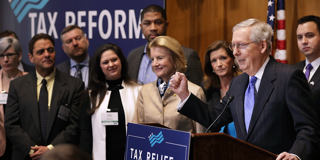OnPoint Subscriber Exclusive
Longer Reads provide in-depth analysis of the ideas and forces shaping politics, economics, international affairs, and more.

How US Corporate-Tax Reform Will Boost Growth
Now that the Republican-led US House of Representatives and Senate have each passed bills to overhaul the tax system, we can start to see what effect the coming changes will have on the US economy. By reducing the costs of investments and cutting the tax rate on corporate profits, the final plan that emerges will likely boost growth substantially.
CAMBRIDGE – With the US Senate and House of Representatives now reconciling their respective tax-reform bills, many in the United States and around the world are wondering what impact the legislation will have on the US economy. Most important, how will the legislation change the country’s long-term growth prospects? To address this question, I focus on three likely changes to the taxation of businesses.